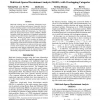Free Online Productivity Tools
i2Speak
i2Symbol
i2OCR
iTex2Img
iWeb2Print
iWeb2Shot
i2Type
iPdf2Split
iPdf2Merge
i2Bopomofo
i2Arabic
i2Style
i2Image
i2PDF
iLatex2Rtf
Sci2ools
109
click to vote
AAAI
2010
2010
Multi-Task Sparse Discriminant Analysis (MtSDA) with Overlapping Categories
Multi-task learning aims at combining information across tasks to boost prediction performance, especially when the number of training samples is small and the number of predictors is very large. In this paper, we first extend the Sparse Discriminate Analysis (SDA) of Clemmensen et al.. We call this Multi-task Sparse Discriminate Analysis (MtSDA). MtSDA formulates multi-label prediction as a quadratic optimization problem whereas SDA obtains single labels via a nearest class mean rule. Second, we propose a class of equicorrelation matrices to use in MtSDA which includes the identity matrix. MtSDA with both matrices are compared with singletask learning (SVM and LDA+SVM) and multi-task learning (HSML). The comparisons are made on real data sets in terms of AUC and F-measure. The data results show that MtSDA outperforms other methods substantially almost all the time and in some cases MtSDA with the equicorrelation matrix substantially outperforms MtSDA with identity matrix .
AAAI 2010 | Clemmensen Et Al | Identity Matrix | Intelligent Agents | Sparse Discriminate Analysis |
| Added | 06 Dec 2010 |
| Updated | 06 Dec 2010 |
| Type | Conference |
| Year | 2010 |
| Where | AAAI |
| Authors | Yahong Han, Fei Wu, Jinzhu Jia, Yueting Zhuang, Bin Yu |
Comments (0)

